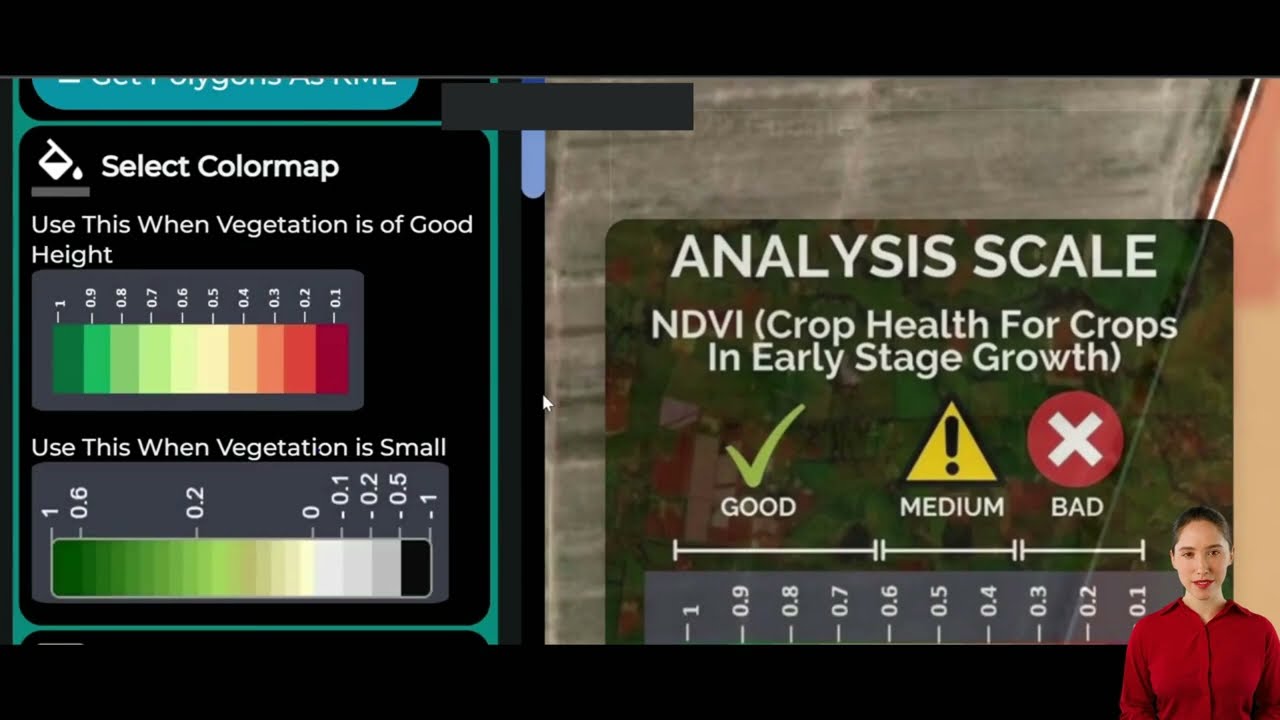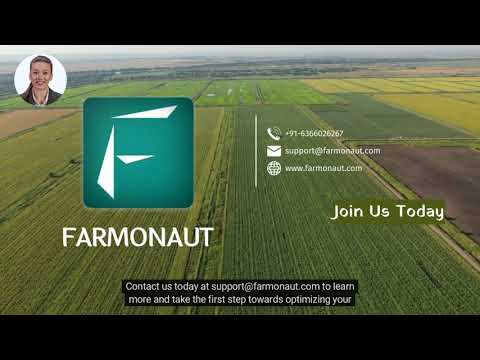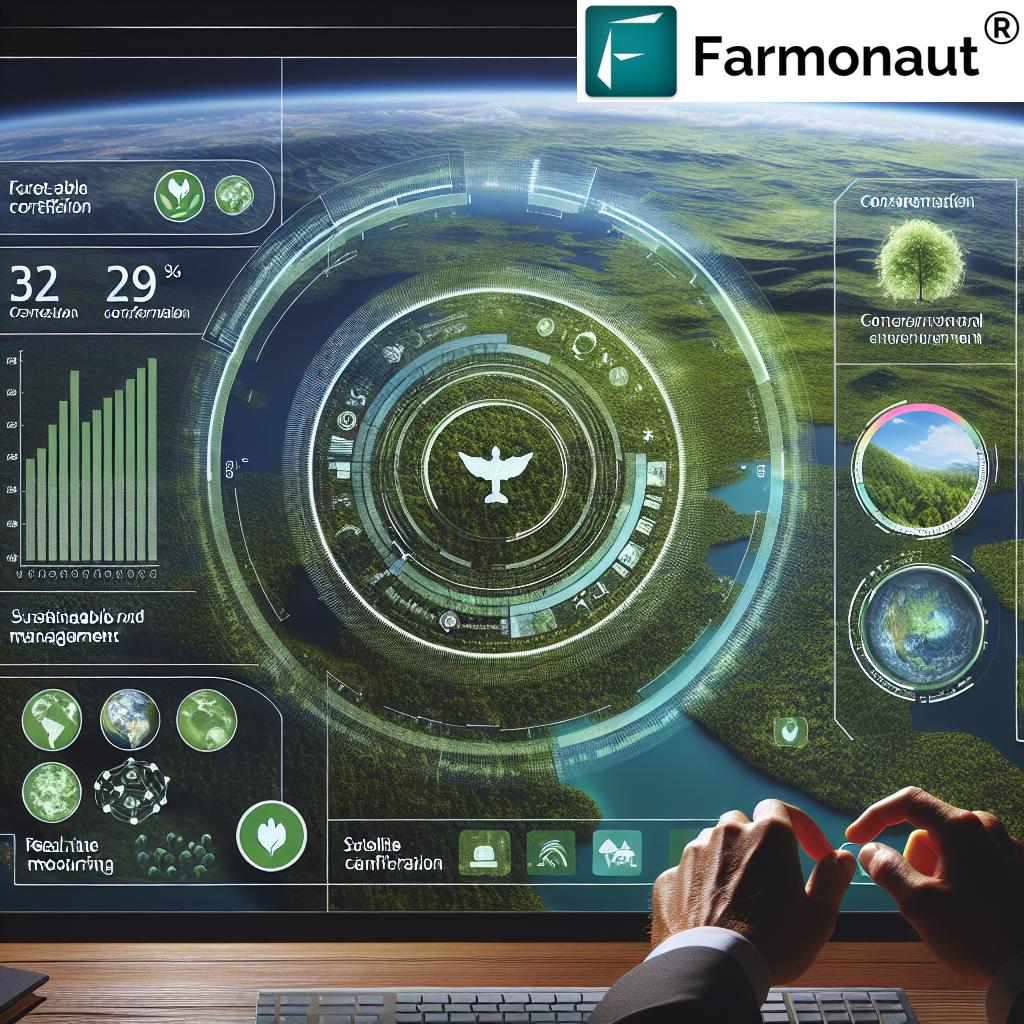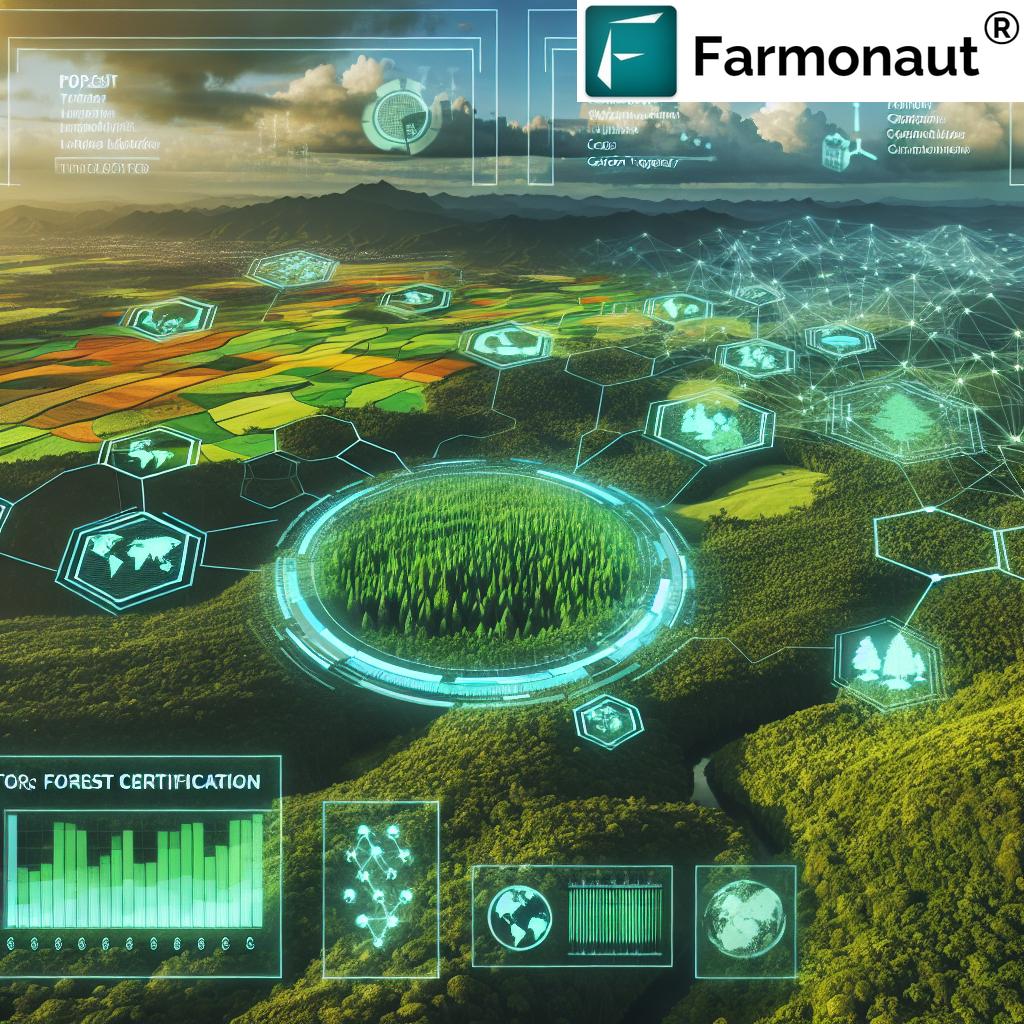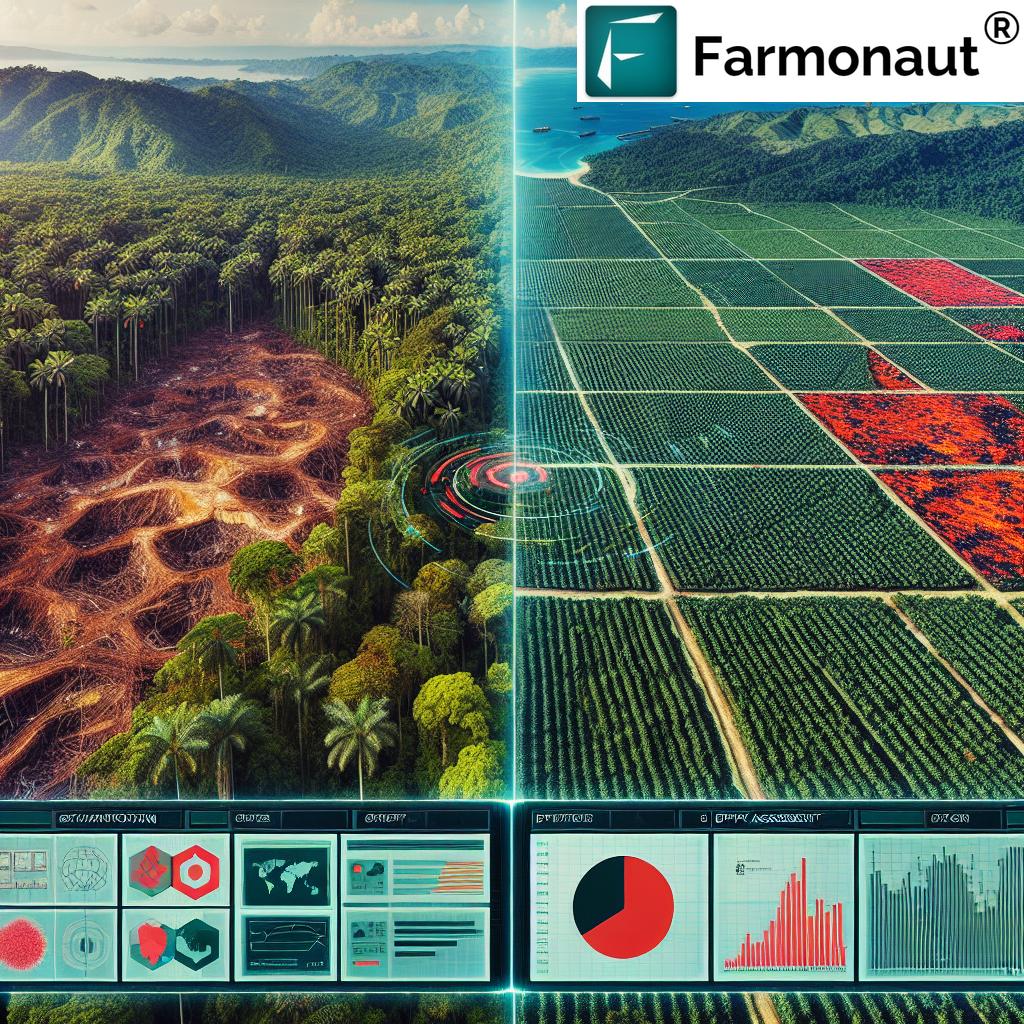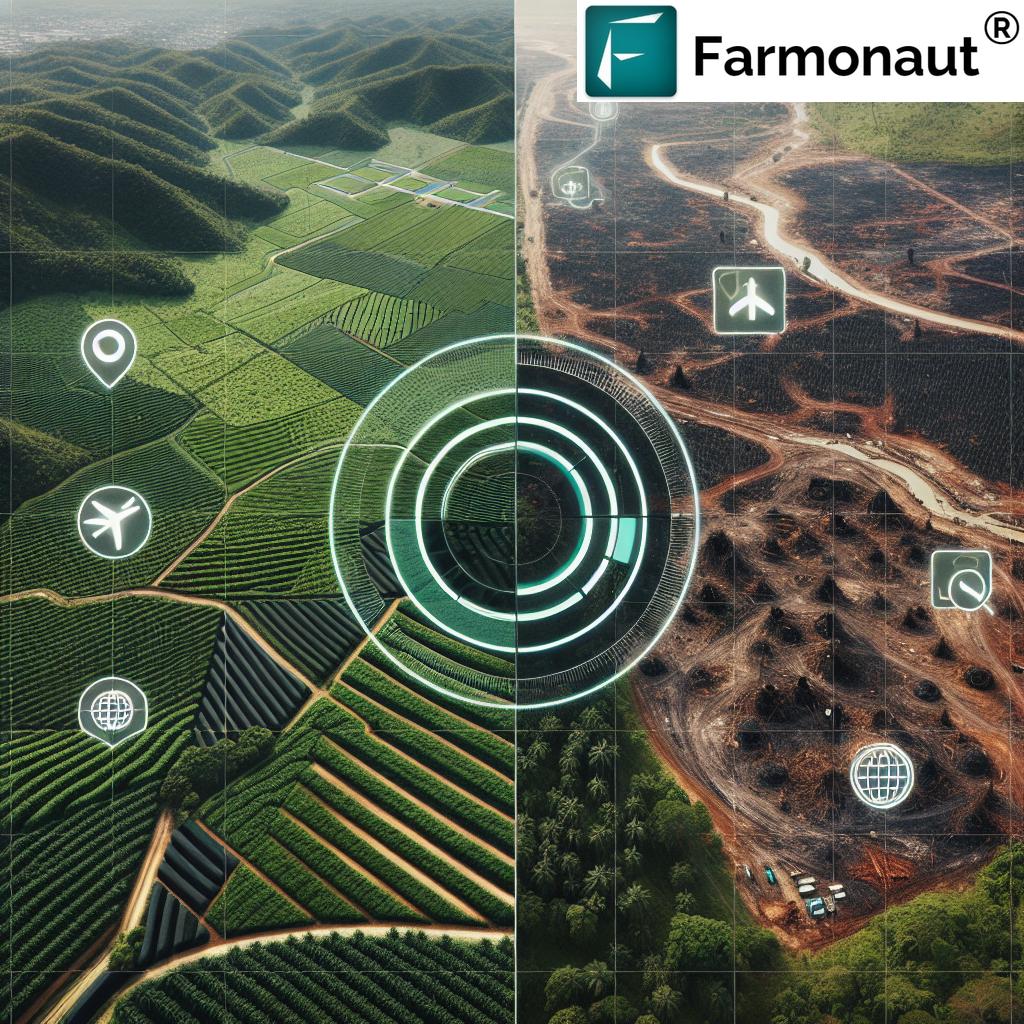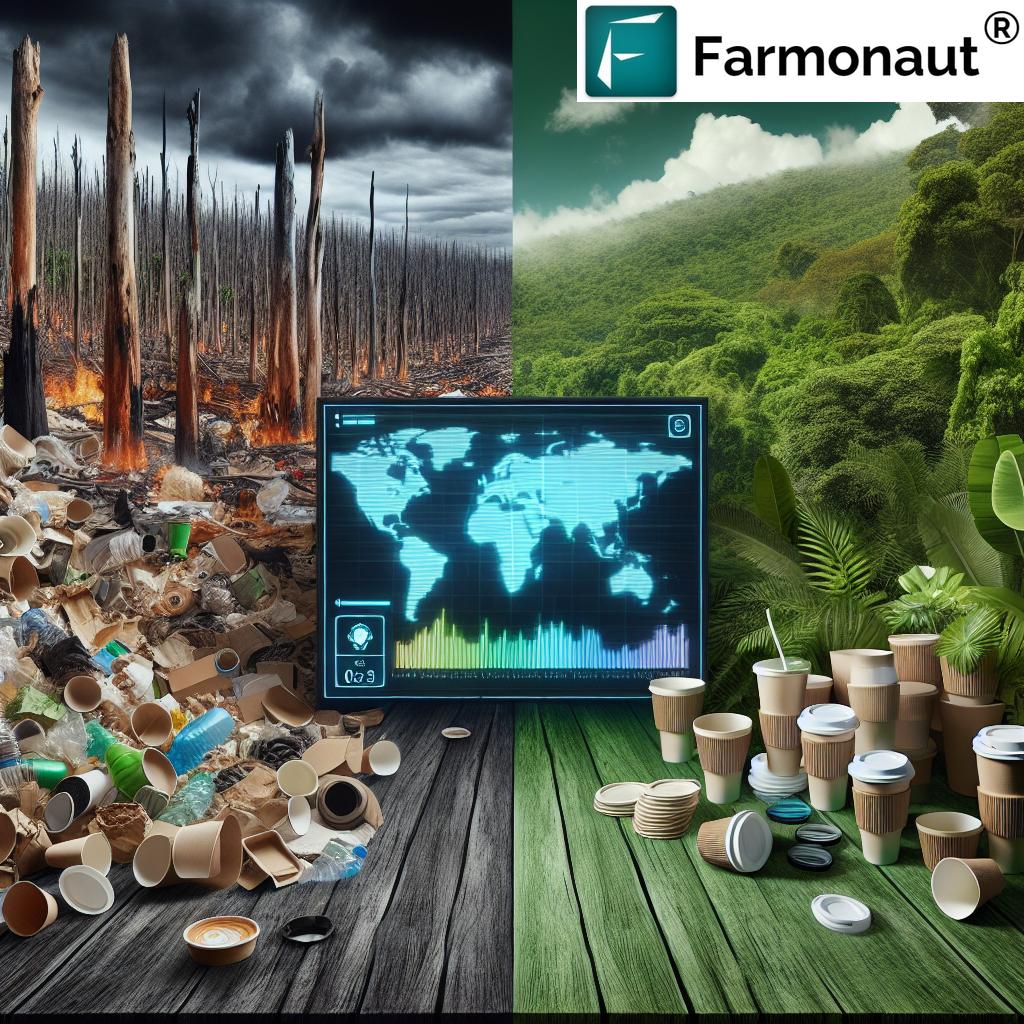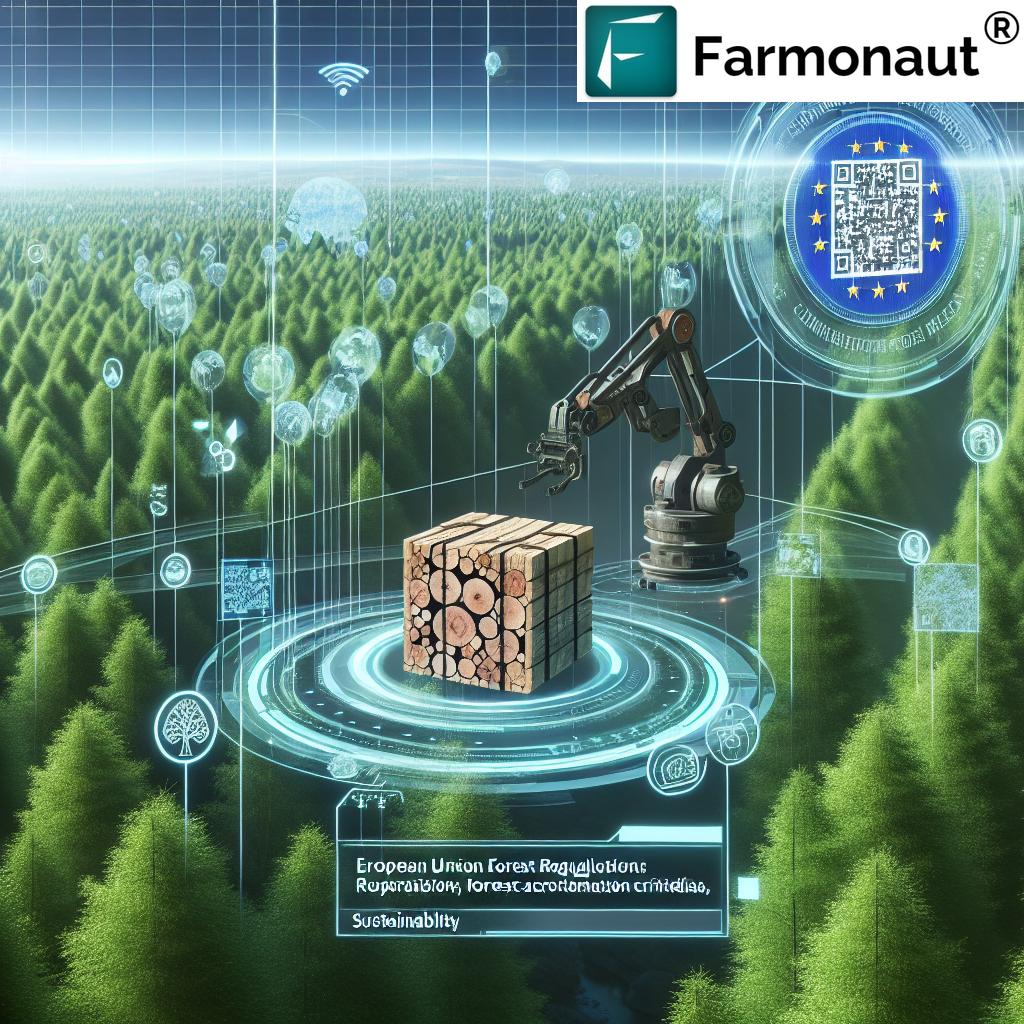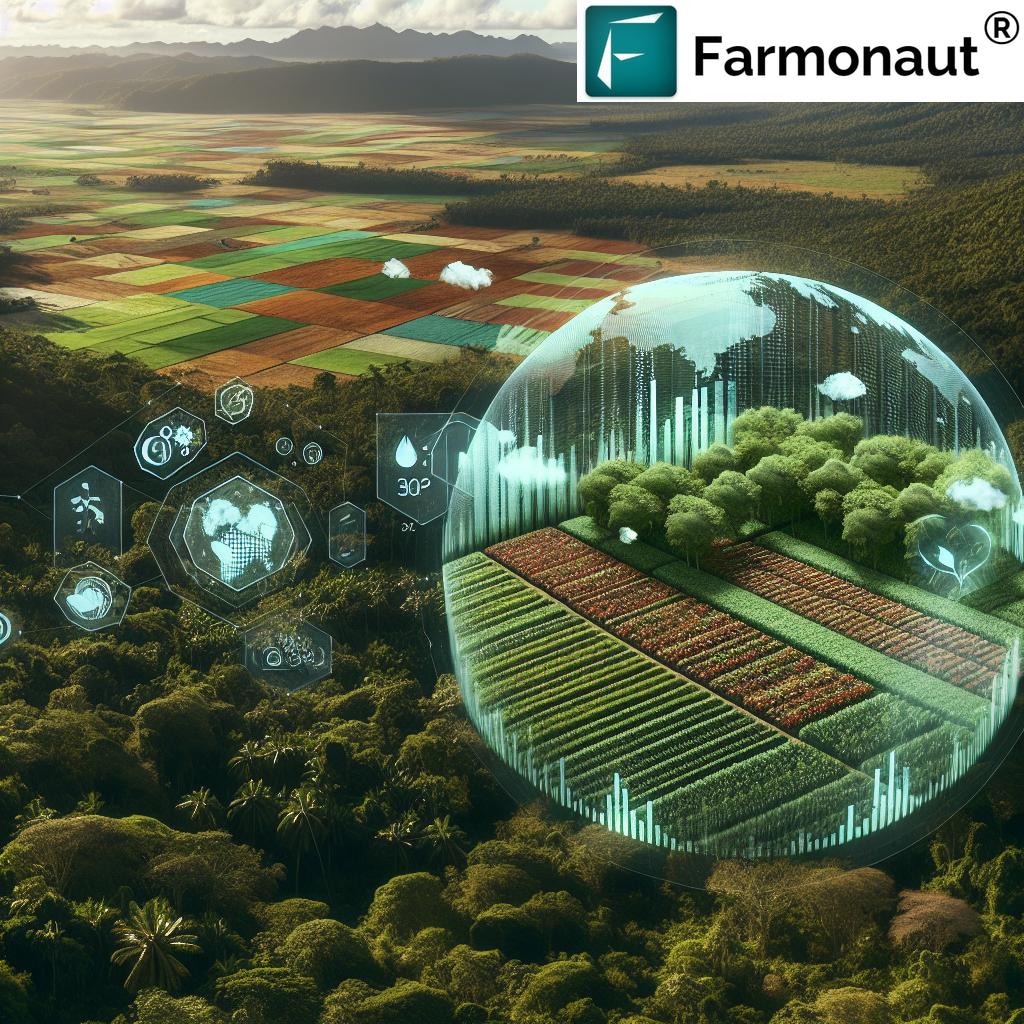Navigating EU Deforestation Regulation: Sustainable Agriculture Practices for Compliant Supply Chains
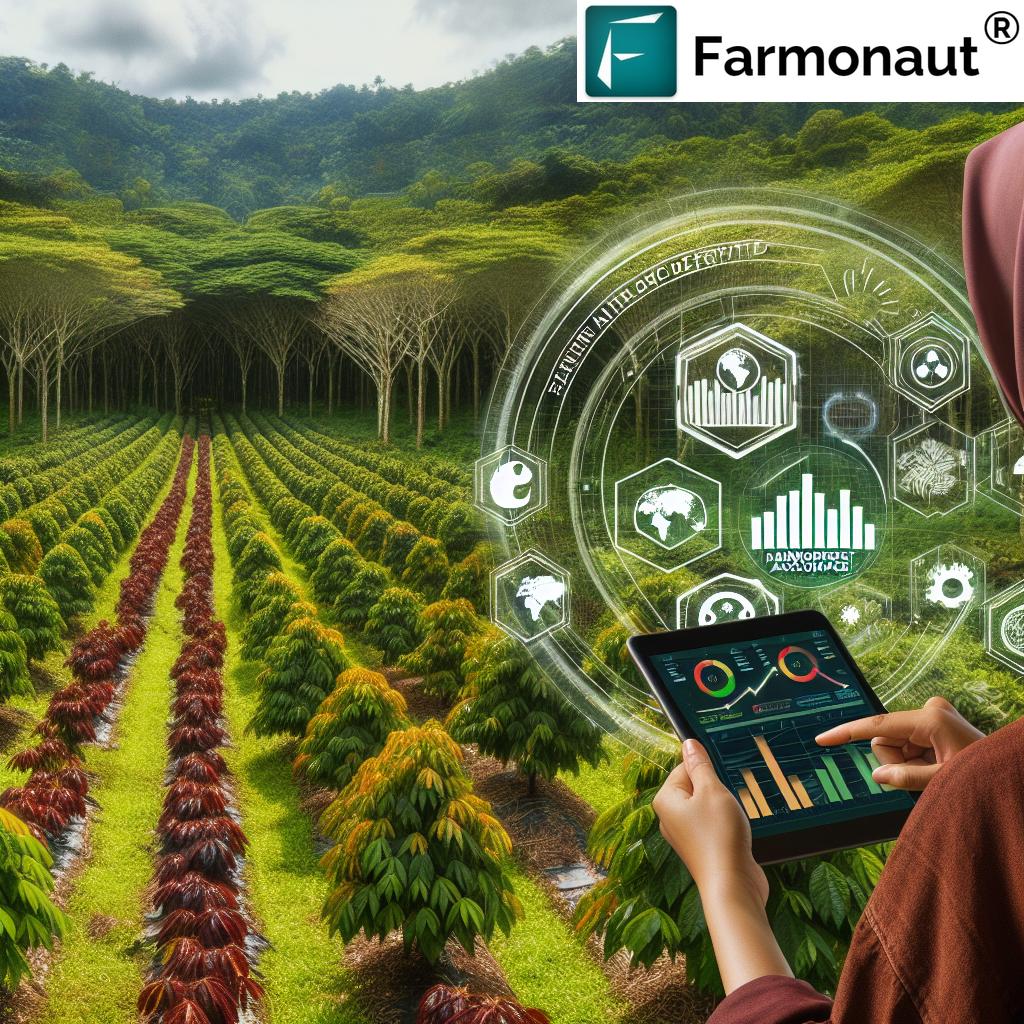
“The EU Deforestation Regulation impacts over 70% of global tropical deforestation linked to agricultural commodities.”
As we navigate the complexities of modern agriculture, the implementation of the EU Deforestation Regulation (EUDR) marks a significant milestone in our journey towards sustainable and responsible farming practices. At Farmonaut, we recognize the critical importance of adapting to these new requirements while maintaining productive and efficient agricultural operations. In this comprehensive guide, we’ll explore the impact of EUDR on agricultural supply chains and delve into the sustainable agriculture practices that can help ensure compliance.
The EUDR represents a pivotal shift in how we approach agriculture and its relationship with our planet’s forests. By focusing on deforestation-free supply chains, this regulation aims to protect some of the world’s most valuable ecosystems while promoting responsible sourcing in agriculture. As we unpack the intricacies of EUDR compliance, we’ll also examine how innovative technologies and sustainable landscape management techniques are reshaping the industry.
From the lush cocoa plantations to the aromatic coffee farms, tropical agriculture faces unique challenges and opportunities in light of these new regulations. We’ll explore how certification programs, regenerative farming techniques, and advanced monitoring and evaluation tools are paving the way for a more sustainable future in agriculture.
Join us as we embark on this journey through the landscape of sustainable agriculture, where responsible sourcing meets innovative agritech solutions, and where the future of our forests and our food systems intertwine.
Understanding the EU Deforestation Regulation
The EU Deforestation Regulation (EUDR) is a groundbreaking legislative framework designed to minimize the European Union’s contribution to global deforestation and forest degradation. This regulation places stringent requirements on companies importing or exporting specific commodities and products that are often associated with deforestation risks.
- Key Commodities Affected: The EUDR focuses on products such as cattle, cocoa, coffee, palm oil, soya, and wood.
- Due Diligence Requirements: Companies must conduct thorough due diligence to ensure their supply chains are deforestation-free.
- Traceability: The regulation demands enhanced traceability measures to track products from source to market.
- Penalties for Non-Compliance: Significant fines and potential market exclusion for companies failing to meet EUDR standards.
For agricultural businesses, compliance with EUDR is not just a legal obligation but also an opportunity to contribute to global sustainability efforts and meet the growing consumer demand for environmentally responsible products.
The Role of Sustainable Agriculture Practices in EUDR Compliance
Sustainable agriculture practices are at the heart of EUDR compliance. These practices not only help in meeting regulatory requirements but also contribute to long-term environmental conservation and improved farmer livelihoods.
- Agroforestry Systems: Integrating trees with crops or livestock to enhance biodiversity and soil health.
- Precision Agriculture: Utilizing technology to optimize resource use and minimize environmental impact.
- Soil Conservation Techniques: Implementing methods like cover cropping and reduced tillage to prevent soil erosion and maintain fertility.
- Water Management: Adopting efficient irrigation systems and water harvesting techniques.
At Farmonaut, we understand the importance of these practices and offer advanced solutions to support their implementation. Our satellite-based crop health monitoring system provides farmers with real-time insights into vegetation health, soil moisture levels, and other critical metrics. This data-driven approach enables informed decision-making for irrigation, fertilizer usage, and pest management, ultimately optimizing crop yields while reducing resource wastage.
Certification and Sustainable Supply Chain Management
Certification plays a crucial role in demonstrating compliance with EUDR and ensuring sustainable supply chain management. Various certification schemes align with the regulation’s requirements and provide a framework for responsible sourcing in agriculture.
- Rainforest Alliance Certification: Focuses on biodiversity conservation and improved farmer livelihoods.
- Forest Stewardship Council (FSC): Ensures responsible management of forest resources.
- Roundtable on Sustainable Palm Oil (RSPO): Promotes sustainable palm oil production.
- UTZ Certification: Emphasizes sustainable farming practices and better opportunities for farmers.
These certification programs not only help in meeting EUDR requirements but also provide a competitive edge in the market. Consumers are increasingly seeking products that are sustainably sourced and environmentally friendly.
Farmonaut’s blockchain-based product traceability solution complements these certification efforts by ensuring transparency and security at every stage of the product’s journey from farm to consumer. This technology enhances trust in supply chains and supports compliance with EUDR’s traceability requirements.
Regenerative Farming Techniques for EUDR Compliance
Regenerative farming goes beyond sustainability, aiming to actively improve the environment. These techniques are particularly effective in meeting EUDR requirements while enhancing ecosystem health.
- Carbon Sequestration: Practices that increase soil organic matter, thereby capturing carbon from the atmosphere.
- Biodiversity Enhancement: Creating habitats for beneficial insects and wildlife to support natural pest control and pollination.
- Crop Rotation and Intercropping: Diversifying crops to improve soil health and reduce pest pressures.
- Minimal Soil Disturbance: Adopting no-till or reduced tillage methods to maintain soil structure and microbial communities.
Farmonaut’s Jeevn AI Advisory System aligns perfectly with these regenerative practices. By analyzing satellite data and other inputs, it provides personalized advice on crop management strategies that promote soil health and biodiversity while optimizing farm productivity.
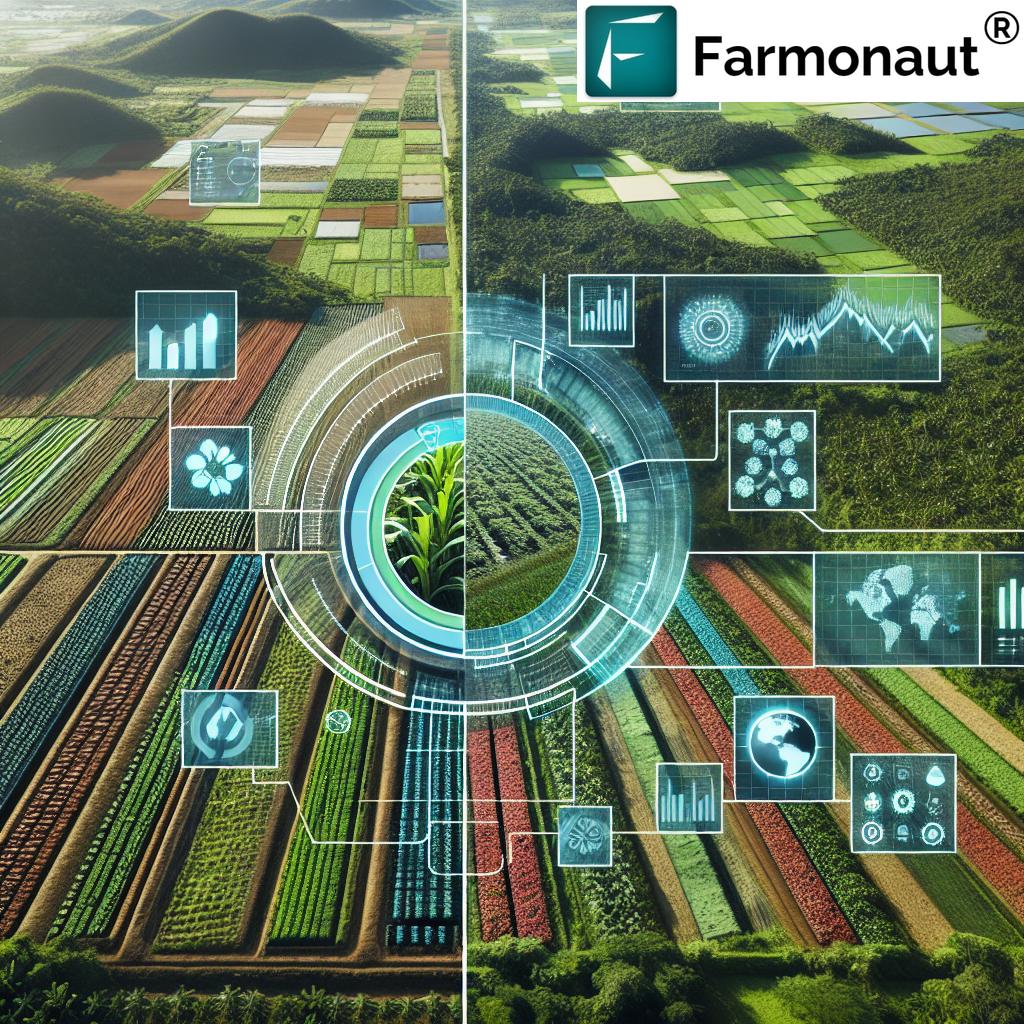
Challenges and Improvements in Tropical Agriculture
Tropical agriculture, particularly in sectors like cocoa and coffee production, faces unique challenges in aligning with EUDR requirements. However, these challenges also present opportunities for significant improvements.
- Deforestation Pressure: Implementing strategies to increase yield on existing farmland rather than expanding into forested areas.
- Soil Degradation: Adopting soil conservation techniques to maintain long-term fertility and productivity.
- Water Scarcity: Developing drought-resistant crop varieties and efficient irrigation systems.
- Pest and Disease Management: Utilizing integrated pest management approaches to reduce reliance on hazardous pesticides.
Farmonaut’s satellite-based monitoring system is particularly beneficial in tropical regions, where traditional field visits can be challenging. Our technology provides real-time insights into crop health and environmental conditions, enabling proactive management of these challenges.
“Sustainable agriculture practices can reduce water usage by up to 30% while increasing crop yields by 20%.”
Sustainable Landscape Management: A Holistic Approach
Sustainable landscape management is crucial for EUDR compliance, as it addresses deforestation and environmental degradation at a broader scale. This approach considers entire ecosystems rather than individual farms or commodities.
- Landscape Restoration: Rehabilitating degraded lands to improve productivity and biodiversity.
- Corridor Conservation: Maintaining wildlife corridors to support biodiversity and ecosystem services.
- Community Involvement: Engaging local communities in conservation efforts and sustainable land use planning.
- Integrated Land Use Planning: Balancing agricultural production with conservation goals at a landscape level.
Farmonaut’s technology supports sustainable landscape management by providing comprehensive data on land use and vegetation health across large areas. This information is invaluable for policymakers, conservation organizations, and agricultural businesses in making informed decisions about land use and conservation strategies.
Monitoring and Evaluation Tools for Agricultural Sustainability
Effective monitoring and evaluation are essential for ensuring compliance with EUDR and measuring the impact of sustainable agriculture practices. Advanced tools and technologies play a crucial role in this process.
- Satellite Imagery Analysis: Using remote sensing to track land use changes and forest cover.
- GIS Mapping: Creating detailed maps of agricultural areas and surrounding ecosystems.
- IoT Sensors: Deploying sensors to collect real-time data on soil conditions, weather, and crop health.
- Big Data Analytics: Analyzing large datasets to identify trends and predict potential issues.
Farmonaut’s platform integrates many of these monitoring and evaluation tools. Our satellite-based crop health monitoring system provides farmers and agricultural businesses with valuable insights into vegetation health, soil moisture levels, and other critical metrics. This data-driven approach enables informed decision-making and helps in demonstrating compliance with EUDR requirements.
For businesses looking to integrate our advanced monitoring capabilities into their systems, we offer API access. Our API allows developers and businesses to incorporate Farmonaut’s satellite and weather data into their own applications, enhancing their ability to monitor and evaluate agricultural sustainability. For more detailed information, please refer to our API Developer Docs.
The Future of Sustainable Commodities
As we look to the future, the landscape of sustainable commodities is evolving rapidly, driven by regulatory pressures like EUDR and increasing consumer awareness. Several trends are shaping this future:
- Blockchain for Traceability: Enhanced supply chain transparency through blockchain technology.
- Climate-Smart Agriculture: Adapting farming practices to climate change while reducing greenhouse gas emissions.
- Biodiversity-Positive Production: Moving beyond ‘do no harm’ to actively enhancing biodiversity in agricultural landscapes.
- Circular Economy in Agriculture: Minimizing waste and maximizing resource efficiency in agricultural production.
Farmonaut is at the forefront of these developments, continuously innovating to meet the evolving needs of sustainable agriculture. Our carbon footprinting feature, for instance, helps agribusinesses monitor and reduce their environmental impact, aligning with the growing focus on climate-smart agriculture.
Implementing EUDR Compliance: A Step-by-Step Guide
Implementing EUDR compliance can seem daunting, but with a systematic approach, businesses can successfully navigate this process. Here’s a step-by-step guide to help agricultural businesses align with EUDR requirements:
- Assess Current Practices: Conduct a thorough audit of existing supply chains and farming practices.
- Identify Risk Areas: Pinpoint potential areas of non-compliance, particularly related to deforestation risks.
- Develop a Compliance Strategy: Create a comprehensive plan to address identified risks and implement sustainable practices.
- Implement Traceability Systems: Establish robust systems to track products from source to market.
- Engage Suppliers: Work closely with suppliers to ensure they understand and can meet EUDR requirements.
- Adopt Sustainable Farming Practices: Implement regenerative farming techniques and sustainable landscape management practices.
- Seek Certification: Pursue relevant certifications that align with EUDR standards.
- Implement Monitoring Systems: Utilize advanced monitoring tools like Farmonaut’s satellite-based system to track compliance and progress.
- Regular Reporting and Transparency: Maintain clear documentation and be prepared for audits and reporting requirements.
- Continuous Improvement: Regularly review and update practices to stay ahead of evolving regulations and best practices.
Farmonaut’s suite of tools can support businesses at various stages of this implementation process. Our satellite monitoring, AI-driven advisory system, and blockchain-based traceability solutions provide the technological backbone needed for effective EUDR compliance.
The Role of Technology in Sustainable Agriculture
Technology plays a pivotal role in enabling and enhancing sustainable agriculture practices, particularly in the context of EUDR compliance. Innovative agritech solutions are transforming how we approach farming and supply chain management.
- Precision Agriculture: Using GPS, sensors, and data analytics to optimize resource use and minimize environmental impact.
- Artificial Intelligence: Employing AI for predictive analytics in crop management and pest control.
- Drone Technology: Utilizing drones for precise mapping, crop monitoring, and targeted application of inputs.
- Blockchain: Ensuring transparency and traceability in agricultural supply chains.
- Internet of Things (IoT): Connecting various farm devices and sensors for real-time monitoring and automated decision-making.
Farmonaut integrates many of these technologies into our platform. Our satellite-based crop health monitoring system, powered by AI and machine learning, provides farmers with invaluable insights for precision agriculture. The Jeevn AI Advisory System delivers personalized, real-time advice on crop management, helping farmers make data-driven decisions that optimize yields while minimizing environmental impact.
For those interested in experiencing the power of our technology firsthand, we invite you to explore our applications:
Comparative Analysis of Sustainable Agriculture Practices for EUDR Compliance
| Commodity | Key Sustainability Challenges | Sustainable Practices | Certification Standards |
|---|---|---|---|
| Cocoa | Deforestation, Child labor, Low farmer income | Agroforestry, Shade-grown cocoa, Fair trade practices | Rainforest Alliance, UTZ |
| Coffee | Water scarcity, Soil degradation, Climate change impact | Water-efficient irrigation, Organic farming, Shade-grown coffee | Fair Trade, Bird Friendly |
| Palm Oil | Massive deforestation, Biodiversity loss, Peatland destruction | Sustainable intensification, No-deforestation policies, Peatland restoration | RSPO (Roundtable on Sustainable Palm Oil) |
| Soya | Deforestation in Amazon, Soil erosion, GMO concerns | Crop rotation, No-till farming, Responsible expansion practices | RTRS (Round Table on Responsible Soy) |
Empowering Farmers and Producers
A crucial aspect of achieving EUDR compliance and promoting sustainable agriculture is empowering farmers and producers. These stakeholders are at the forefront of implementing sustainable practices and need support to transition to more environmentally friendly methods.
- Education and Training: Providing farmers with knowledge about sustainable practices and EUDR requirements.
- Access to Technology: Ensuring farmers have the tools and technology needed for precision agriculture and sustainable farming.
- Financial Support: Facilitating access to loans and financial incentives for implementing sustainable practices.
- Market Access: Connecting farmers practicing sustainable agriculture with premium markets that value EUDR compliance.
Farmonaut’s platform plays a significant role in this empowerment process. By providing affordable access to advanced satellite monitoring and AI-driven advisory services, we enable farmers of all scales to implement precision agriculture techniques. Our technology democratizes access to data-driven farming, helping small and medium-sized farms compete in a rapidly evolving agricultural landscape.
The Economic Impact of Sustainable Agriculture
While the primary focus of EUDR is environmental protection, it’s important to consider the economic implications of transitioning to more sustainable agricultural practices. Contrary to some concerns, sustainable agriculture can offer significant economic benefits:
- Increased Productivity: Sustainable practices often lead to improved soil health and higher yields over time.
- Cost Savings: Efficient resource use and reduced input costs can improve profitability.
- Premium Pricing: EUDR-compliant products may command higher prices in the market due to increased consumer demand for sustainable goods.
- Long-term Resilience: Sustainable practices help farms better withstand climate change impacts, ensuring long-term viability.
- Access to New Markets: Compliance with EUDR opens up opportunities in the EU market and other regions prioritizing sustainability.
Farmonaut’s solutions contribute to these economic benefits by optimizing resource use and improving farm management. Our fleet and resource management tools help agribusinesses reduce operational costs, while our AI-driven insights support better decision-making for improved productivity and profitability.
Collaborative Approaches to EUDR Compliance
Achieving EUDR compliance and promoting sustainable agriculture is not a solitary endeavor. It requires collaboration across the entire supply chain and among various stakeholders. Here are some key collaborative approaches:
- Multi-Stakeholder Initiatives: Bringing together farmers, businesses, NGOs, and governments to address sustainability challenges collectively.
- Public-Private Partnerships: Collaborations between government agencies and private companies to support sustainable agriculture initiatives.
- Research Collaborations: Partnerships between agricultural businesses and research institutions to develop innovative sustainable practices.
- Supply Chain Cooperation: Close collaboration between suppliers, processors, and retailers to ensure end-to-end sustainability.
Farmonaut supports these collaborative efforts by providing a platform that facilitates data sharing and joint decision-making. Our technology can be integrated across various points in the supply chain, enabling a more coordinated approach to sustainable agriculture and EUDR compliance.
Looking Ahead: The Future of Agriculture Under EUDR
As we look to the future, it’s clear that the EU Deforestation Regulation will continue to shape the landscape of global agriculture. Here are some key trends and developments we anticipate:
- Increased Adoption of Technology: We expect to see wider adoption of advanced technologies like satellite monitoring, AI, and blockchain in agriculture.
- Shift in Global Supply Chains: There may be a realignment of supply chains as businesses seek EUDR-compliant sources.
- Innovation in Sustainable Practices: Ongoing research and development will likely lead to new, more efficient sustainable farming methods.
- Harmonization of Standards: We may see greater alignment between different sustainability standards to simplify compliance processes.
- Consumer Awareness: Increased transparency will likely lead to greater consumer awareness and demand for sustainable products.
Farmonaut is committed to staying at the forefront of these developments. We continually update our technology and services to meet the evolving needs of sustainable agriculture and EUDR compliance. Our goal is to empower farmers and businesses with the tools they need to thrive in this changing agricultural landscape.
Conclusion
Navigating the EU Deforestation Regulation presents both challenges and opportunities for the agricultural sector. By embracing sustainable agriculture practices, leveraging innovative technologies, and fostering collaboration across the supply chain, businesses can not only achieve compliance but also contribute to a more sustainable and resilient food system.
At Farmonaut, we’re dedicated to supporting this transition with our cutting-edge agritech solutions. From satellite-based crop monitoring to AI-driven advisory services and blockchain-based traceability, our tools empower farmers and businesses to meet EUDR requirements while optimizing their operations.
As we move forward, the path to sustainable, deforestation-free agriculture may seem complex, but it’s a journey worth taking. By working together and harnessing the power of technology, we can create a future where agriculture thrives in harmony with our planet’s forests and ecosystems.
FAQ Section
- What is the EU Deforestation Regulation (EUDR)?
The EUDR is a legislative framework designed to minimize the EU’s contribution to global deforestation by placing requirements on companies importing or exporting specific commodities associated with deforestation risks. - How does Farmonaut support EUDR compliance?
Farmonaut offers satellite-based crop monitoring, AI-driven advisory services, and blockchain-based traceability solutions that help businesses implement sustainable practices and meet EUDR requirements. - What are some key sustainable agriculture practices for EUDR compliance?
Key practices include agroforestry, precision agriculture, soil conservation techniques, and efficient water management. - How can technology aid in sustainable agriculture?
Technology like satellite imaging, AI, IoT sensors, and blockchain can optimize resource use, improve decision-making, and enhance supply chain transparency. - What are the economic benefits of implementing sustainable practices?
Benefits include increased productivity, cost savings through efficient resource use, potential premium pricing for sustainable products, and improved long-term resilience.



